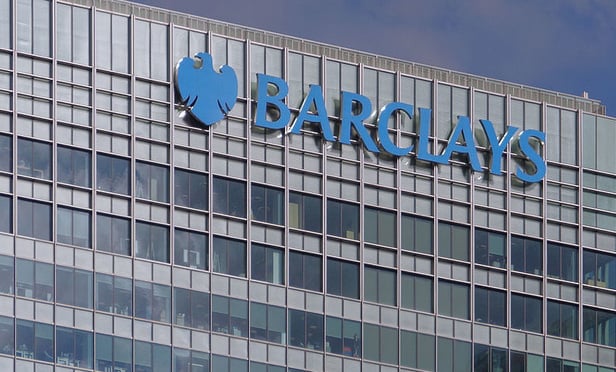Linklaters declined Barclays role on 2008 Qatar loan over legality concerns, court filing claims
Credit crunch dispute over controversial capital raising turns spotlight on magic circle firm's role
August 21, 2017 at 07:09 AM
4 minute read
Linklaters refused to represent Barclays in connection with a controversial $3bn loan from Qatar at the height of the 2008 financial crisis amid concerns over its legality, papers filed at the High Court have claimed.
The claim is made in a filing by PCP Capital Partners, a private equity vehicle that had been working with Sheikh Mansour, a member of the ruling family of Abu Dhabi. In September 2008 Barclays had been looking to raise in excess of £6.5bn in capital and was in discussions with both PCP and Qatar Holding, then Barclays' largest shareholder.
According to documents filed this month in the Commercial Court in London, on 12 November 2008, Barclays' then-solicitors at Linklaters told Latham & Watkins, which was acting for the State of Qatar on the proposed loan, that "[so as to] seek to ensure that no financial assistance is being provided… the purpose clause should make it clear that the facility is being used for investments other than in Barclays".
The filing states: "The Qatar Facility Agreement did not include any such representation", and that "on the same day or the next, Linklaters declined to continue to act for Barclays in respect of the loan".
It continues: "It should be inferred that Linklaters resigned (at least in part) because it was concerned that the Qatar loan would be illegal, specifically that it would involve unlawful financial assistance by Barclays for the purchase of its own shares."
The claim cites an email dated 13 November 2008 between senior Barclays bankers Stephen Jones and Roger Jenkins, which says: "They have resigned on our loan to [Qatar], ostensibly on conflict grounds. Clearly very concerned about being [sic] to control where cash ends up."
PCP is claiming hundreds of millions in damages from Barclays with regards to false representations about the terms of the investment, claiming that its reliance on Barclays' representations meant that it missed out on hundreds of millions in potential fees or profits.
Allen & Overy took the lead role for PCP on the 2008 negotiations over the Saudi investment, while Clifford Chance acted for Barclays.
PCP is now being advised by City law firm Fladgate on the dispute, with partner Bree Taylor in the lead role. Simmons & Simmons is acting for Barclays.
The latest developments come after this June it was revealed that Barclays and four of its former executives are facing fraud charges over the 2008 Qatari loan.
The Serious Fraud Office announced that the bank and the four individuals had been charged with "conspiracy to commit fraud and the provision of unlawful financial assistance".
The four former executives are Roger Jenkins, who was the executive chairman of investment banking and investment management in the Middle East and North Africa for Barclays Capital, former Barclays chief executive John Varley, Barclays' former European financial institutions head Richard Boath and the former chief executive of Barclays Wealth and Investment Management Tom Kalaris.
Barclays is being advised by US firm Willkie Farr & Gallagher, while Varley has instructed City firm Corker Binning. Herbert Smith Freehills and Greenberg Traurig are acting for Jenkins, Boath is being represented by Peters & Peters and Kalaris by Steptoe & Johnson.
Three former senior in-house lawyers at Barclays also fell within the scope of the investigation, but have not been charged - former Barclays GC Mark Harding, who retired from the bank in 2013 after 10 years in the role; former corporate and investment banking GC Judith Shepherd, who left the bank in 2015; and former head of M&A legal Matthew Dobson, now general counsel for life capital at insurer Swiss Re.
Harding is being represented by BCL Burton Copeland business crime partner Richard Sallybanks, while Shepherd is being advised by Eversheds Sutherland corporate crime head Neill Blundell. Dobson is being represented by Winston & Strawn disputes partner Justin McClelland.
Linklaters declined to comment.
This content has been archived. It is available through our partners, LexisNexis® and Bloomberg Law.
To view this content, please continue to their sites.
Not a Lexis Subscriber?
Subscribe Now
Not a Bloomberg Law Subscriber?
Subscribe Now
NOT FOR REPRINT
© 2025 ALM Global, LLC, All Rights Reserved. Request academic re-use from www.copyright.com. All other uses, submit a request to [email protected]. For more information visit Asset & Logo Licensing.
You Might Like
View All
Kirkland, Paul Hastings, White & Case, Freshfields advise on Top German Deals
2 minute read
Kirkland Steers Paris-based Antin in ‘Year’s Biggest’ Infrastructure Fund Closing, at €10.2B
3 minute read
Venezuela Faces Creditor Class Action Suit After Missing $1.5B Bond Payments
2 minute read
Top German Banking Partners Seiler & Rath Rejoin Latham After White & Case Stint
3 minute readTrending Stories
- 1'It's Not Going to Be Pretty': PayPal, Capital One Face Novel Class Actions Over 'Poaching' Commissions Owed Influencers
- 211th Circuit Rejects Trump's Emergency Request as DOJ Prepares to Release Special Counsel's Final Report
- 3Supreme Court Takes Up Challenge to ACA Task Force
- 4'Tragedy of Unspeakable Proportions:' Could Edison, DWP, Face Lawsuits Over LA Wildfires?
- 5Meta Pulls Plug on DEI Programs
Who Got The Work
Michael G. Bongiorno, Andrew Scott Dulberg and Elizabeth E. Driscoll from Wilmer Cutler Pickering Hale and Dorr have stepped in to represent Symbotic Inc., an A.I.-enabled technology platform that focuses on increasing supply chain efficiency, and other defendants in a pending shareholder derivative lawsuit. The case, filed Oct. 2 in Massachusetts District Court by the Brown Law Firm on behalf of Stephen Austen, accuses certain officers and directors of misleading investors in regard to Symbotic's potential for margin growth by failing to disclose that the company was not equipped to timely deploy its systems or manage expenses through project delays. The case, assigned to U.S. District Judge Nathaniel M. Gorton, is 1:24-cv-12522, Austen v. Cohen et al.
Who Got The Work
Edmund Polubinski and Marie Killmond of Davis Polk & Wardwell have entered appearances for data platform software development company MongoDB and other defendants in a pending shareholder derivative lawsuit. The action, filed Oct. 7 in New York Southern District Court by the Brown Law Firm, accuses the company's directors and/or officers of falsely expressing confidence in the company’s restructuring of its sales incentive plan and downplaying the severity of decreases in its upfront commitments. The case is 1:24-cv-07594, Roy v. Ittycheria et al.
Who Got The Work
Amy O. Bruchs and Kurt F. Ellison of Michael Best & Friedrich have entered appearances for Epic Systems Corp. in a pending employment discrimination lawsuit. The suit was filed Sept. 7 in Wisconsin Western District Court by Levine Eisberner LLC and Siri & Glimstad on behalf of a project manager who claims that he was wrongfully terminated after applying for a religious exemption to the defendant's COVID-19 vaccine mandate. The case, assigned to U.S. Magistrate Judge Anita Marie Boor, is 3:24-cv-00630, Secker, Nathan v. Epic Systems Corporation.
Who Got The Work
David X. Sullivan, Thomas J. Finn and Gregory A. Hall from McCarter & English have entered appearances for Sunrun Installation Services in a pending civil rights lawsuit. The complaint was filed Sept. 4 in Connecticut District Court by attorney Robert M. Berke on behalf of former employee George Edward Steins, who was arrested and charged with employing an unregistered home improvement salesperson. The complaint alleges that had Sunrun informed the Connecticut Department of Consumer Protection that the plaintiff's employment had ended in 2017 and that he no longer held Sunrun's home improvement contractor license, he would not have been hit with charges, which were dismissed in May 2024. The case, assigned to U.S. District Judge Jeffrey A. Meyer, is 3:24-cv-01423, Steins v. Sunrun, Inc. et al.
Who Got The Work
Greenberg Traurig shareholder Joshua L. Raskin has entered an appearance for boohoo.com UK Ltd. in a pending patent infringement lawsuit. The suit, filed Sept. 3 in Texas Eastern District Court by Rozier Hardt McDonough on behalf of Alto Dynamics, asserts five patents related to an online shopping platform. The case, assigned to U.S. District Judge Rodney Gilstrap, is 2:24-cv-00719, Alto Dynamics, LLC v. boohoo.com UK Limited.
Featured Firms
Law Offices of Gary Martin Hays & Associates, P.C.
(470) 294-1674
Law Offices of Mark E. Salomone
(857) 444-6468
Smith & Hassler
(713) 739-1250









